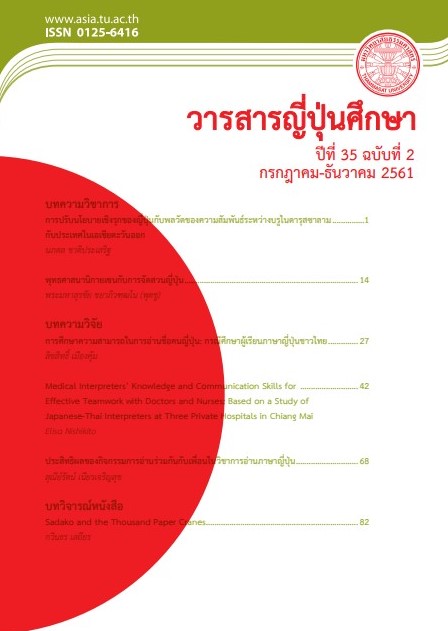พุทธศาสนานิกายเซนกับการจัดสวนญี่ปุ่น
คำสำคัญ:
พุทธศาสนานิกายเซน, สวนญี่ปุ่น, วัฒนธรรมญี่ปุ่นบทคัดย่อ
บทความนี้มีวัตถุประสงค์เพื่ออธิบายแนวคิดการจัดสวนญี่ปุ่น ซึ่งเป็นศิลปวัฒนธรรมญี่ปุ่นอย่างหนึ่งที่ได้รับอิทธิพลมาจากพุทธศาสนาและผสมผสานกับความเชื่อดั้งเดิมในญี่ปุ่นเอง จึงกลายเป็นรูปแบบและแนวคิดการจัดสวนที่สอดแทรกคำสอนทางพุทธศาสนาในเชิงปรัชญาอย่างน่าขบคิด และสะท้อนภูมิปัญญาการจัดสวนของชาวญี่ปุ่นที่ไม่เหมือนใคร การจัดส่วนญี่ปุ่นทั่วไปมี 3 ประเภท คือ 1) สวนภูเขา 2) สวนในที่ราบ และ 3) สวนน้ำชา รูปแบบการจัดแต่ละประเภทมีลักษณะภูมิทัศน์ที่แตกต่างกัน โดยเฉพาะไม้ประดับตกแต่ง รวมถึงสถานที่และการใช้ประโยชน์ภายในสวน สวนที่สะท้อนแนวคิดตามแบบเซนอย่างแท้จริงก็คือสวนในที่ราบ โดยเฉพาะสวนในพื้นที่แห้งที่มีทรายหรือก้อนกรวดแทนการปลูกหญ้าหรือมอส แล้วสมมติเป็นพื้นน้ำ ก้อนหินวางเรียงสมมติเป็นเกาะ สวนประเภทนี้มีนัยทางพุทธปรัชญาเป็นอย่างมาก เพราะเน้นการตกแต่งให้น้อยที่สุด มีความเรียบง่าย ไม่ฟุ่มเฟือย เพื่อให้อยู่ติดกับธรรมชาติ ขณะที่สวนน้ำชาเป็นการนำลักษณะเด่นของสวนภูเขาและสวนในที่ราบมาผสมผสานและเน้นพิธีชงชาหรือซาโด (Sado) เป็นพิเศษ ญี่ปุ่นได้รับพิธีนี้มาจากวัฒนธรรมจีนและประยุกต์ให้เข้ากับการจัดสวนที่มีกระท่อมชาไว้สำหรับชงชาโดยเฉพาะ พิธีชงชาแบบญี่ปุ่นจะเน้นความมีสติทุกอิริยาบถ ตั้งแต่การชง การริน กระทั่งการดื่มที่ให้รู้สึกถึงรสชาติของชา มีสติกำกับตลอดเวลา รวมจิตเป็นหนึ่งเดียวกับการดื่ม กระทั่งไม่มีการแบ่งแยกระหว่างคำว่าชากับผู้ดื่มพิธีชงชาจึงเป็นการฝึกสติที่ประยุกต์เข้ากับวิถีชีวิต ดังที่ปรากฏในสวนน้ำชาโดยตรงหรือสวนแบบเซนที่นิยมจัดไว้มุมใดมุมหนึ่งภายในวัดเซนเอง




